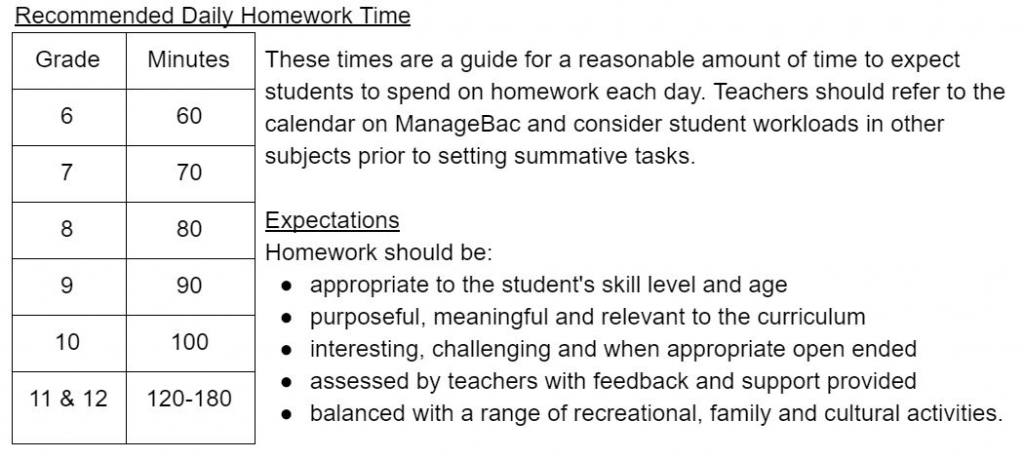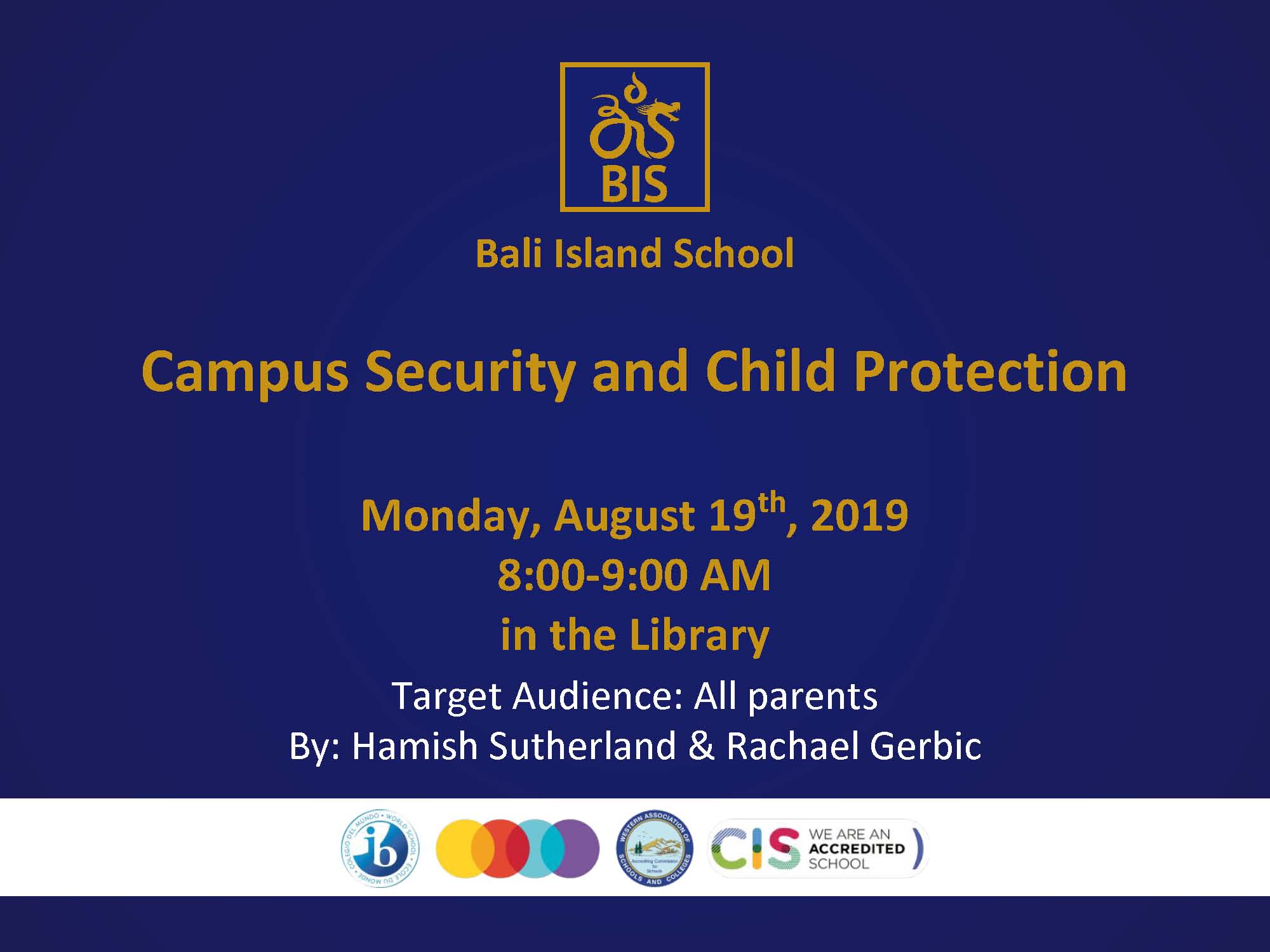Secondary Newsletter 3 – August 16, 2019
Dear Parents,
Thank you to the parents who attended a number of meetings we held this week. On Monday morning we welcomed about twenty new and existing parents to clarify some aspects of Secondary operations. On Wednesday the class parents met with the Homeroom (HR) teachers to get to know each other and discover how our parents can further support HR teachers. We are very hopeful the lines of communication between school and home will be opened even further and that you continue to be well-informed. On Thursday and Friday, Mr. Sutherland conducted EOTC Trip sessions for each grade level which were also very well attended.
Homework Expectations
(from the BIS Secondary Homework Policy (May 2019)

Parents can support students by:
- developing a positive and productive approach to homework
- ensuring there is a balance between the time spent on homework and recreational activities
- reading to them, talking with them and involving them in learning opportunities during everyday household routines and physical activity
- talking to teachers about any concerns they have about the homework
- attending the school events their child is involved in
- Checking and signing Student Planners regularly
- discussing homework with their child in their first language, if English is not the main language spoken at home, and linking it to previous experiences
- linking homework and other learning activities to the families’ culture, history and language, linking with relevant services, clubs, associations and community groups.
Helping your child manage their time on devices
Ross Ferris
Are you sure your kids are sleeping when they go to bed?
I am aware of students interacting on social media such as WhatsApp late into the night. This is long after parents believe their children are sleeping in bed. If there are learning or behavioral issues at school then we try to find the cause. Often it comes back to students not getting enough quality sleep to arrive rested and prepared to learn the next day. What can a parent do about this? Do not allow your children to take their phones or tablets to their bedrooms. Have a central location where these devices are stored, locked if necessary, overnight.
How do I know what my child is doing on their laptop or phone?
This is one of the most common things I am asked by parents. It is true, many of the tasks our students are set require them to use their laptops to find information, to communicate their understanding and/or to collaborate with their teacher and peers.
If a student is spending hours on their devices at home my first question would relate to how much of that was spent interacting on social media or playing games and how much was spent completing set homework or studying.
An extract from https://evolvetreatment.com/blog/myth-multitasking-media-teens-homework/
“Research tells us that multitasking – meaning actually doing more than one or more activities at the same time that take a significant amount of attention – is not a real thing. Instead we do is called task-switching, which is exactly what it sounds like: we don’t do two things at once, we switch between various tasks. Sometimes we do it rapidly and sometimes we may switch between three or four tasks in the space of an hour. Research also tells us that task-switching comes at a cost. When we constantly task switch, three unwanted things happen:
- We lose time, and therefore, productivity.
- We impair our ability to encode information into memory.
- We impair our ability to retrieve the information we did manage to encode into memory.”
Some resources which may be helpful:
- Commonsense Media – Gives advice to parents about anything related to media and what is age-appropriate. https://www.commonsensemedia.org/
- Kids & Tech: Tips for Parents in the Digital Age https://www.healthychildren.org/English/family-life/Media/Pages/Tips-for-Parents-Digital-Age.aspx
- Apps for parents to monitor their children’s mobile use. https://www.familyeducation.com/10-apps-for-parents-to-monitor-kids-mobile-use
- More Monitoring Apps https://www.learningliftoff.com/5-best-monitoring-apps-for-parents/
- Homework vs. Social Media: Unplugging Your Teen. https://www.the-instillery.com/story/homework-vs-social-media-unplugging-your-teen
Diploma Programme
Matt Wood (DP Coordinator)
Class of 2019 DP results at a glance
The class of 2019 are gone but are certainly not forgotten and their legacy will live long in the memory. The class of 2019 managed a 100% pass rate for the IBDP candidates and managed to top the average points total of the class of 2018 by almost a whole point. What a fantastic achievement!
We also saw three students pick up 3 additional ‘bonus’ points for exemplary performances in Extended Essay and Theory of Knowledge. To put that into context, 23% of the graduating class received 3 points in comparison to the 2018 world average of 7.73%!
Our students received a mean grade in all of their subjects of 5.37 compared to a world average of 4.79. Impressive!
The signs are there, the data does not lie, we are a fantastic small school with dedicated teachers and students who set themselves high standards and achieve them. We are operating at a level above other similarly sized schools and we will continue to do and hopefully improve on these results with the class of 2020.

Grade 7 & 10
All of Grade 7 will follow the 7A timetable and all of Grade 10 will follow the 7B timetable from Monday. The homerooms for Grade 7 and 10 will remain as they are.
CAS Corner
” Thursday, 15 August 2019
Demonstrate how to initiate and plan a CAS experience.
Less than two weeks before my second time participating in this EOTC trip involving Coral Rehabilitation, I feel that this year is going to be quite different from the events of last year. As a result of me choosing Coral Rehabilitation as my group of interest last year, I must continue this group as part of this year’s EOTC. However, I feel significantly more confident in choosing Coral Rehabilitation to provide service to the community around me, compared to last year. I have reflected on the accomplishments of last year, & I understood the ways in which my group & I may improve for this year, showcasing my ability to recognise last year’s limitations to truly create an impactful environment for this year. With the help of my classmates & our accompanying teachers, we were able to effectively brainstorm ideas that could further provide service to the people of Les Village. Consequently, we arrived at the conclusion that Les Village centres itself around the concept of ecotourism. Henceforth, each of my classmates supplied various ideas on how to help Les Village with promoting their tourism.

Identify own strengths and develop areas for growth AND Demonstrate the skills and recognize the benefits of working collaboratively.
What was done in the previous year was giving a poor steel structure to attach coral onto, which ultimately did not work due to the inefficient communication between each other. So this year, rather than limiting our time & research capabilities to less than 2 weeks, instead we decided that we would rather help Les Village in different ways to rehabilitate coral when we arrive, & rather send a steel structure in the future. This is so it would allow for my group & I to research effective methods of rehabilitating coral. So the other ideas that we discussed were to contact the people in charge of the ecotourism in Les Village, research coral structures to create in the future, & to research flora & fauna that live around the Les Village area. To explain each in detail, I explained my idea of e-mailing the leader of Les Village so that we could grasp a better understanding, from their perspective, what & how we could help their community; rather than arriving at Les Village & demanding they implement ideas of our own, we would rather ask beforehand what they would specifically like for us to help with. This allows stronger communication between Bali Island School & Les Village. Secondly, a classmate of mine thought of using their research skills as a strength to enhance our poor previous year structures into a fully-functional model of its own for us to give to them if Les Village would like for us to do so. Lastly, another classmate pitched the idea of creating a guidebook for the Les Village website to identify reasons why tourists should visit Les Village for diving, as it would improve their eco-tourism. With all of these wonderful ideas, the last thing we needed to do was delegate the tasks to each other; so rather than one person take up all jobs, we would relieve the tasks of each of us to work on a task each. With the help of our teachers, we efficiently delegated the tasks based on each other’s interest & specific skill-sets. For example, a classmate of mine demonstrates high research skills, therefore we delegated the researching component to her. Overall, this would allow for a swift course of action leading up to the day of EOTC. “
Natasha Klee

